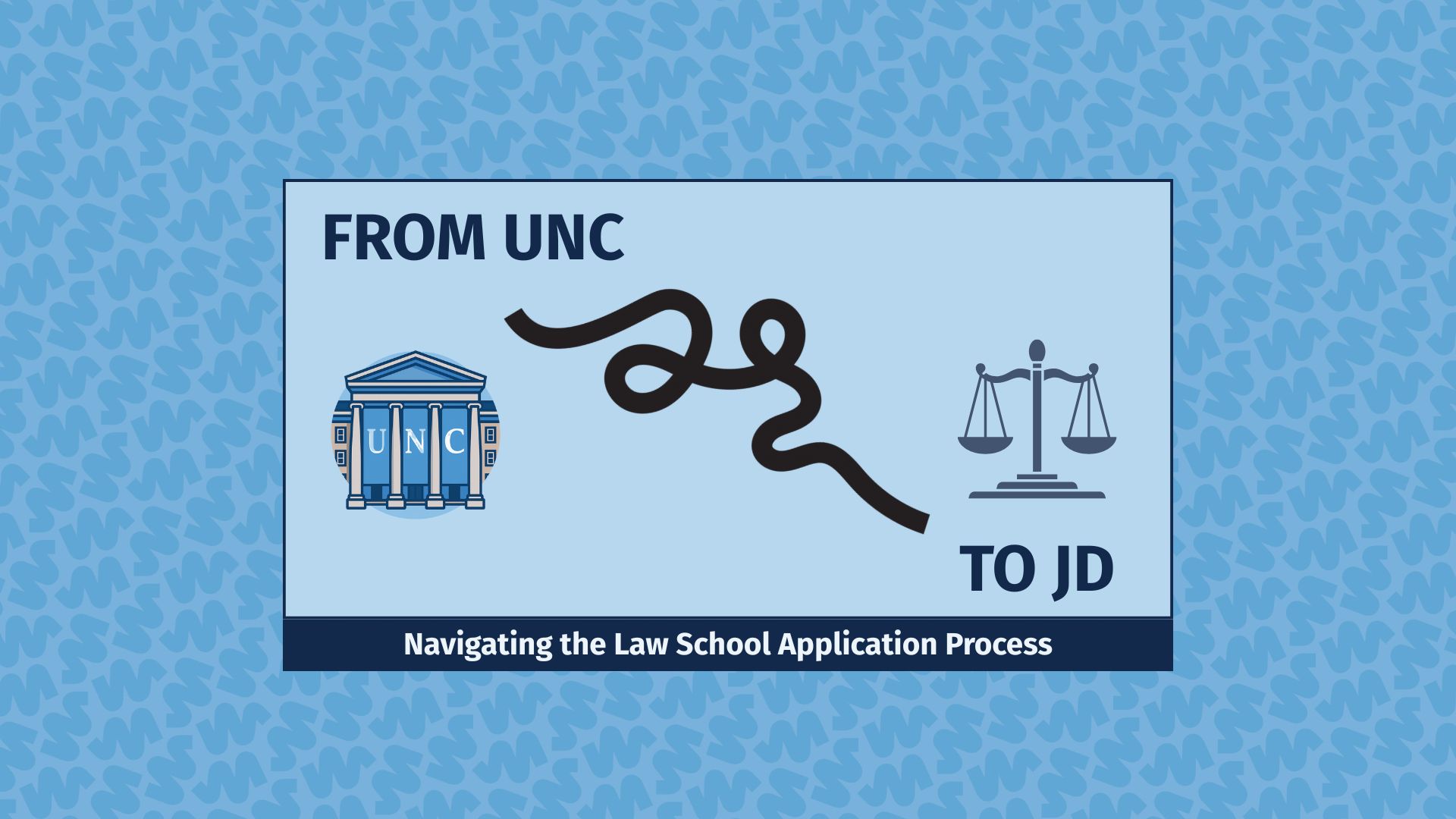Pre-Law advising, resources, and preparation at UNC
Thinking about law school can feel overwhelming. You do not need to do everything at once. This page is designed to help you find your next step, whether you are just exploring or actively applying.
Exploring Pre-Law
Not sure if law school or a legal career path is right for you yet? That is completely normal. Exploration is about gathering information and testing your interest, not making final decisions.
This stage focuses on:
- Trying low-stakes experiences to see what interests you
- Understanding what lawyers actually do across different practice areas
- Identifying skills that align with legal work
Learn about different types of law
If you are unsure what attorneys actually do day to day, start by exploring different practice areas.
- Explore legal practice areas
Vault’s practice area guides provide clear, student-friendly overviews of different types of law and the kinds of work attorneys do in each area.- More information on our Vault resource can be found here: https://careers.unc.edu/resource/vault/
Try a low-stakes legal experience
You do not need a legal internship to begin exploring. Virtual experiences can help you understand legal work before committing time or coursework.
- Forage Legal Job Simulations
Short (or long), self-paced simulations created by law firms and legal organizations that introduce common legal tasks and workflows.- More information on our Forage resource and how to create a free account can be found here:https://careers.unc.edu/forage-virtual-work-experiences-platform/
Talk to people and reflect on fit
Conversations can help you understand how legal careers align with your interests, values, and strengths.
Good next steps:
- Connect with UNC alumni working in legal and law-adjacent roles through Heels Engage
- Reach out to professionals on LinkedIn to learn about their career paths and day-to-day work
- Attend networking workshops, alumni panels, or employer info sessions hosted by the Career Center and our campus partners.
If you would like help thinking through what you are learning, or deciding what to explore next, you are welcome to schedule a general career coaching appointment with any career coach. Pre-law advising is not required at this stage.
Planning & Preparing for Law School
Law school preparation looks different at every stage. UNC’s pre-law resources are designed to help you build skills, gain experience, and stay organized without doing everything at once.
UNC Year-by-Year Pre-Law Guide
UNC’s Year-by-Year Pre-Law Guide outlines concrete, realistic actions for each stage of your undergraduate journey. These are not generic law school checklists — they are built around UNC opportunities, campus resources, and alumni connections.
Choose the section, not the title, that matches where you are now. Remember: there is no ONE path or timeline to law school!
- Freshmen and Sophomores: Explore and Build Skills
- Focus on skill-building, exposure to legal work, and early reflection using UNC workshops, student organizations, and alumni conversations.
- Juniors: Prepare and Plan
- Begin formal planning with LSAT diagnostics, school research, and relationship-building with faculty and mentors at UNC.
- Seniors and Alumni: Finalize and Apply
- Refine your materials, manage timelines, and use UNC advising, writing, and financial planning resources to submit strong applications.
Top Skills Law Schools Look For
Law schools care far more about how you think, communicate, and analyze than about your major.
UNC’s Top 10 Pre-Law Skills highlight the abilities that law schools consistently value — and show how students can build them through UNC classes, student organizations, research, service, and work experiences.
Top 10 Skills to Prioritize at UNC:
- Critical reading and analysis
- Writing and argumentation
- Oral communication and public speaking
- Logical reasoning and problem-solving
- Research and information synthesis
- Time management and organization
- Professionalism and ethical judgment
- Collaboration and teamwork
- Leadership and initiative
- Self-reflection and adaptability
These skills can be developed across many majors and activities at Carolina.
Build these skills through UNC coursework
If you are interested in taking courses that strengthen these skills or explore law-related topics, you can browse the UNC Course Catalog to identify classes that align with your interests.
When searching the catalog, try keywords such as “law,” “legal,” “justice,” “policy,” “ethics,” or “regulation” to identify legal/law-specific courses across multiple departments.
You do not need to major in a specific field or take “law-titled” courses to be a strong law school candidate. Focus on classes that challenge you to read closely, write clearly, speak persuasively, and think critically.
Applying to Law School
Applying to law school can feel intense, especially when advice is coming from many different places. You do not have to navigate the application process alone — and you also do not need to figure out everything at once.
UNC’s Pre-Law Pathway is a guided, in-depth resource designed to help you understand and manage every major part of the law school application process, from early planning through submission.
What the Pre-Law Pathway Covers
The Pathway includes structured guidance on:
- Application timelines and decision strategies
- LSAT planning and preparation considerations
- Building a cohesive application narrative
- Letters of recommendation and relationship planning
- Understanding how experiences connect across application materials
- Preparing for the realities of applying to law school
The Pathway is self-paced and designed to help you move forward with clarity, not pressure.

Application Strategy & Advising Support
Pre-law advising appointments are designed to help you refine your application strategy, clarify priorities, and plan next steps.
Advising appointments focus on:
- Application timing and school selection
- How your experiences fit together across materials
- Strengths, gaps, and overall strategy
Before you book, please note:
- Appointments book up in advance, especially during peak application periods
- Students are expected to review this webpage and complete the Pre-Law Pathway before meeting with a pre-law advisor
- Being prepared allows appointments to focus on strategy, not general overviews
Personal statement support:
- For detailed writing feedback and editing, use the UNC Writing Center
- Advisors can discuss ideas, themes, and overall message
Stay Connected with the Pre-Law Newsletter
The monthly UNC Pre-Law newsletter shares timely insights, curated opportunities, and practical guidance for students at all stages of the pre-law journey — not just those applying this cycle. Each issue typically includes:
- Advisor insights on common questions, stress points, and decisions
- Admissions & application trends that matter for UNC students
- Workshops, info sessions, and networking opportunities
- Internships, career tools, and experiential opportunities
- Spotlights on resources like the Writing Center and Career Center programs
How to subscribe:
- Go to your Handshake profile.
- In your profile’s “Looking For” section, click the Pencil icon.
- In the “Industries” section, search for Legal & Law Enforcement.
- Add it as an industry of interest and click Save.
Once you do this, your email will be added to the Pre-Law listserv, and you’ll begin receiving monthly updates and curated opportunities
Support and Coaching
You do not need to have everything figured out before meeting with an advisor. Because advising appointments are in high demand, students are expected to review the resources on this page before scheduling an appointment.
Advising appointments are designed to build on that foundation and focus on strategy, clarity, and decision-making rather than general overviews.
Advising appointments focus on:
- Clarifying next steps and priorities
- Making sense of timelines and options
- Connecting experiences, goals, and plans
- Identifying strengths and potential gaps
Before scheduling an appointment:
- Review the information and resources on this page
- Complete the Pre-Law Pathway if you are preparing to apply
- Come prepared with specific questions or decisions you want to discuss
Types of support available:
- Workshops and programs: skills, networking, and application support
- Our full-semester events calendar can be found on both Handshake and Heel Life!
- General career coaching: exploration, reflection, and decision-making
- Pre-law advising: law school application strategy and planning
Pre-Law FAQs (Frequently Asked Questions)
What is “pre-law” at UNC Chapel Hill?
Pre-law is not a major or program of study. It’s an advising track for students who are considering law school after graduation. You can pursue any major and still be “pre-law.”
What majors do law schools prefer?
Law schools do not prefer any specific major. Instead, they look for rigorous coursework, strong writing and analytical skills, and a record of academic success—regardless of discipline.
When should I start preparing for law school?
It’s never too early to explore the field of law! Most students begin actively preparing in their junior or senior year, but many start researching earlier. Use our Year-by-Year checklists above for ideas on how to get started!
Should I take a gap year before law school?
Taking one or more gap years is a common choice, but it’s not required. Many students benefit from time to gain work experience, build financial stability, or clarify their career goals. Others choose to apply directly from undergrad. Law schools admit strong candidates from both pathways—what matters most is that your application reflects readiness, purpose, and experience that supports your decision to pursue law.
What experiences should I pursue to strengthen my application?
Law schools value:
- Meaningful employment and/or public service work
- Research, writing, and critical thinking experience
- Internships in legal or advocacy settings
- Leadership roles and community engagement
Do I need to take the LSAT?
Most U.S. law schools require the LSAT (Law School Admission Test). However, some schools now also accept the GRE. Check each law school’s policy before deciding which test to take.
What is a competitive LSAT score?
The LSAT is scored from 120–180. A score of 160+ is often considered competitive for many schools, while 170+ is typical for top-14 (T14) programs. But your score goal should align with the schools you’re interested in.
What GPA do I need for law school?
There’s no universal cutoff, but a strong GPA (3.5+) is important, especially for competitive programs.
How do I connect with UNC alumni in the legal field?
Use:
- Career fairs and law school info sessions
- Student organizations with alumni panels
Where can I get help with my personal statement?
We offer support through:
- University Career Center Pre-Law Advising Appointments (via Handshake)
- Please see the Get Essay Support section above for more details!
How do I request letters of recommendation?
Ask professors or professionals who know your work well and can speak to your writing, research, and analytical abilities. Request letters early (at least 6–8 weeks in advance).
Can I study abroad and still be pre-law?
Yes! Study abroad experiences can strengthen your global awareness and communication skills—both valued by law schools.
